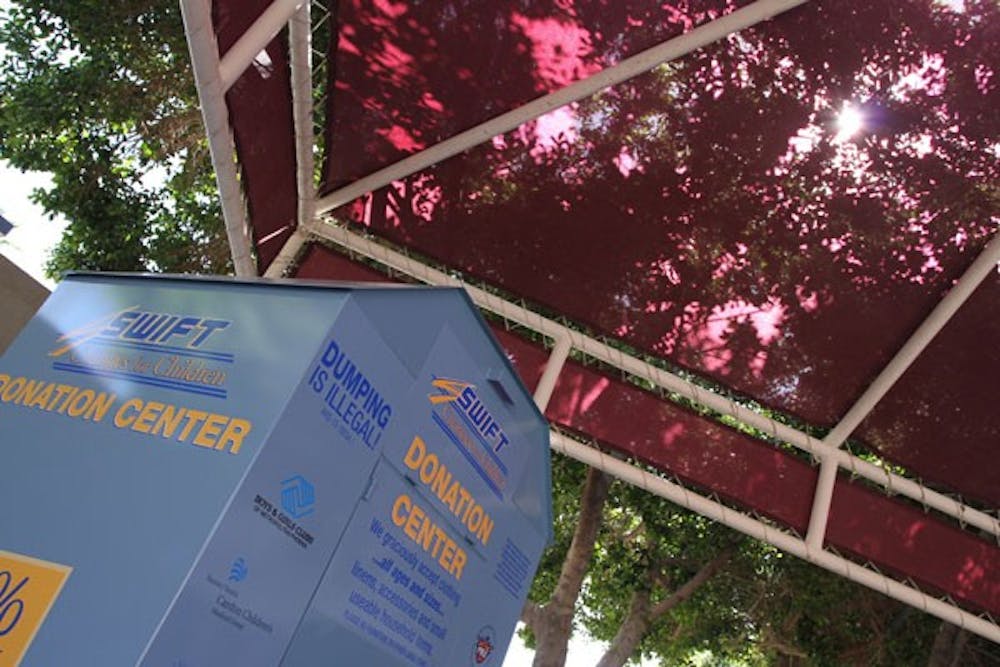This is the first year all four campuses are involved in this waste reduction effort, which lasts until May 17.
Rebecca Reining, coordinator for sustainability and strategic initiatives at University Housing, is a coordinator for the effort, though many others are involved.
“So much stuff gets thrown out during move-out,” Reining said. “We’re trying to divert as much of that as possible and make people aware of how much stuff doesn’t have to go to the landfill. Things that are usable can be donated; things that are recyclable can be recycled.”
Other than education and awareness, the goal is to collect 25,000 pounds of usable goods and donate them to charities, including Swift Charities for Children, House of Refuge and the Arizona Humane Society, she said.
Most of the usable goods, like clothing, small household items and furniture, are reserved for Swift Charities for Children and the website has specifics for what can be donated and where the collection bins are, Reining said.
There are three types of collection boxes or areas that are located around residence halls and at other locations on campus: special recycling collections, Swift Charities for Children collection boxes and large collection areas.
The special recycling collection boxes are available all year to collect broken appliances and electronics, and the large collection areas are for items that are messy, fragile or can’t fit in Swift collection boxes.
Swift Charities for Children, a local nonprofit organization, donates items to other organizations that benefit children or raises money for those organizations from selling the items, said Amanda Smith, the vice president of marketing and community relations for the nonprofit.
“Depending on the current need of different organizations that we partner with, some of it gets immediately donated to local homeless shelters or different programs in need of specific items,” Smith said. “The rest of it gets sold, and 100 percent of the money raised goes back into the Arizona youth community.”
In 2008, Smith said the charity received 9,975 pounds of usable donations from Ditch the Dumpster, and after it created a website in 2009 and more students became involved, the nonprofit received 14,233 pounds of items.
“You can see kids walking out of their dorm room, walking on their way to throw something that is still usable into the dumpster just because they don’t want to move it,” Smith said. “They’ll see the donation station and then they’ll just drop it there instead. You can absolutely see that you’re diverting waste from the dumpster.”
House of Refuge, a nonprofit organization that helps homeless people transition into independence, is located on the Polytechnic campus and is receiving donations solely from that campus.
“Swift is going to take whatever [House of Refuge] can’t use over there, because they’re small and they don’t have a lot of room for stuff like furniture and large items,” Reining said.
Jehnifer Niklas, the program coordinator for University Sustainability Practices in the Global Institute of Sustainability, encouraged donating egg-crate mattress pads to the Arizona Humane Society.
“We can count those toward our usable totals now as long as students properly dispose of them in the charity bins and not in the dumpster,” she said.
Eric Tank, an industrial engineering sophomore, one of the vice presidents of the Sustainability Initiatives Group and an intern in the University Sustainability Practices office, is also helping with the planning.
“One of my goals is trying to do what I can to help the University eliminate its waste,” Tank said. “At move-out, there’s a tremendous amount of perfectly good items being thrown away.”
The Sustainability Initiatives Group started last summer, he said.
“We literally formed it to be a student group to help get move-in recycling going for this past fall,” Tank said.
Reining said next semester there will be more of a focus on move-in recycling.
On May 10, there will be three special collection locations to inform students about the initiative at Palo Verde Beach, Hassayampa Academic Village’s lawn and Barrett, the Honors College lawn.
“We wanted to have one day where we could set up something that would be a visual cue and a reminder to people that might be moving — that we’re here and don’t forget to donate and/or recycle your stuff,” Reining said.
Reach the reporter at reweaver@asu.edu





